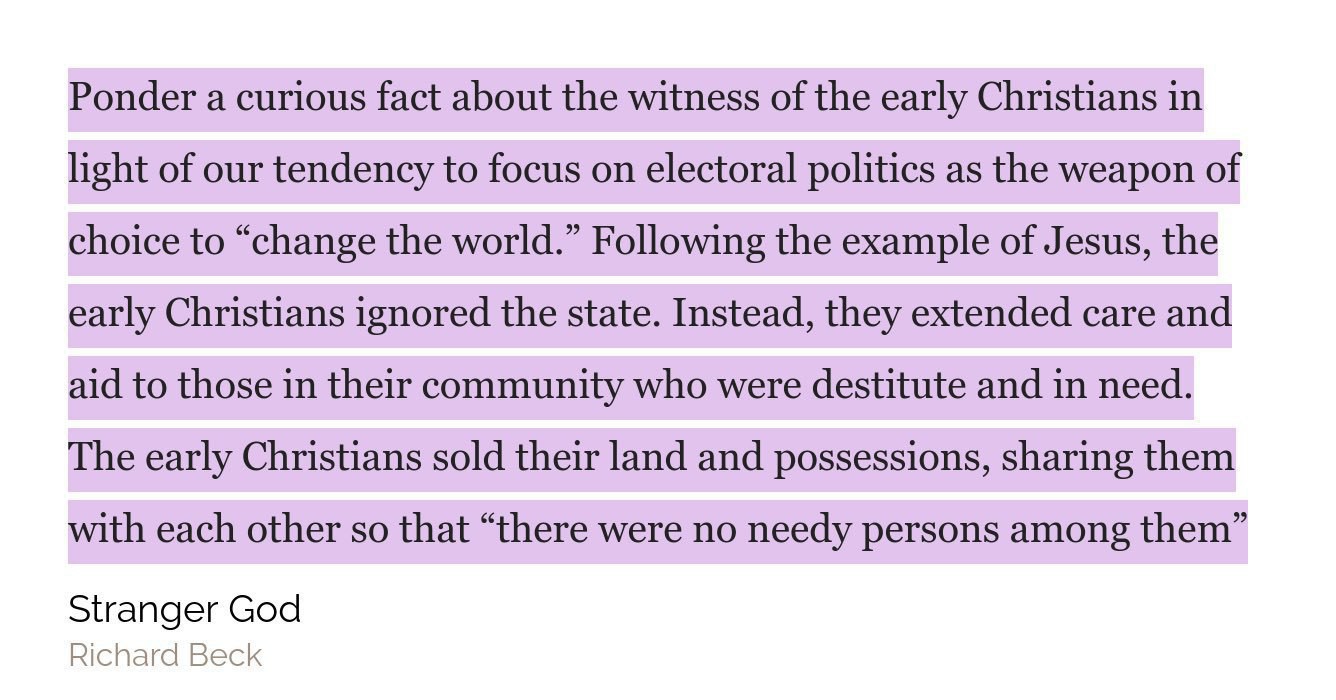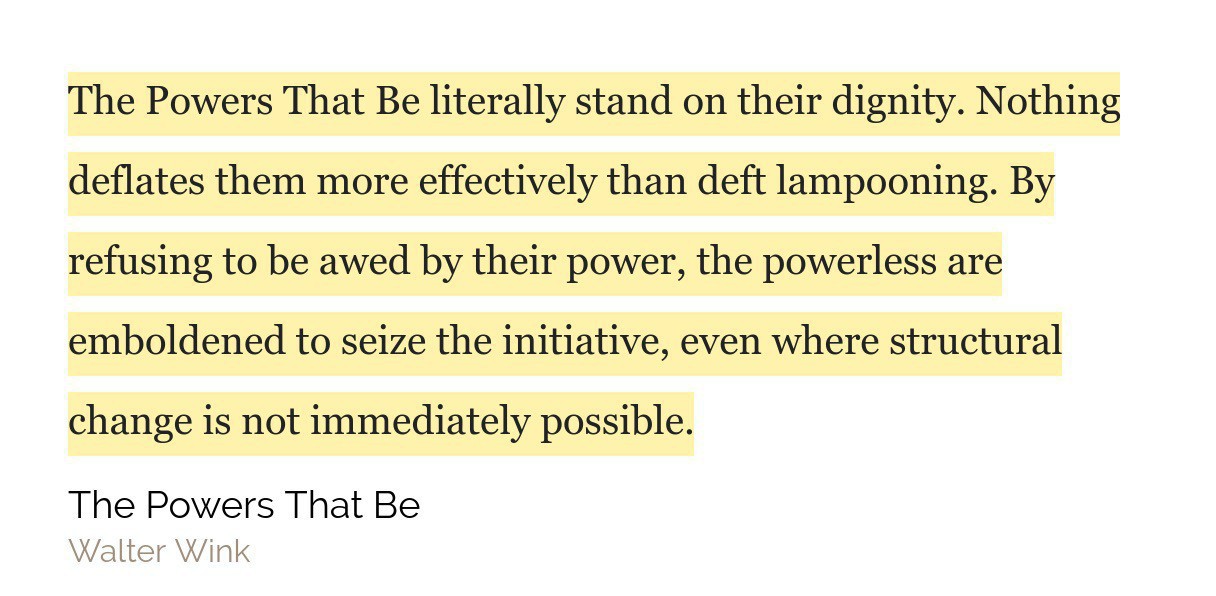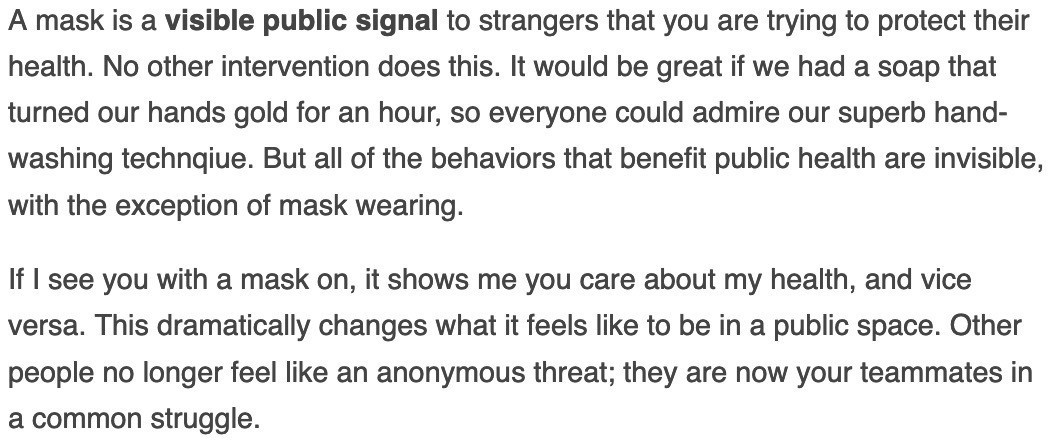Ideas
- I’m thankful that the Lord of Flies is wrong. I’m thankful that people predominantly want to help humanity, and that those that want to exploit it for their own wealth or ego are a minority. I’m thankful that we see more people sharing food, advice, help, seeds, recipes, and tools than we see angry white doomsday preppers that are mad they didn’t get to have apocalypse standoffs.
- I’m thankful for coronavirus haircuts, quarantine beards, and hair colors returning, for long walks, sports-season-delays, and the absence of quarterly fast fashion dictates. I’m even thankful for endless stories of sourdough-making and crafts projects. I’m thankful for chats around dinner tables, in backyards, and on patios. I’m thankful for swept porches, tended gardens, and home projects.
- I pray that our global reprieve from advertising-based conspicuous consumption will persist, if even in some small degree. I pray that we will find ways to alter world economies towards circular movement and sustainability, instead of just-in-time supply chains and extractive growth. I pray that we will be able to spend more of our time and attention on the things that matter to our friends, family, and community, and less on activities and products that we are told we should want.
- I hope that we continue to drive less and walk more, buy less and share more, throwaway less and repair more, consume less and create more, desire less and care more.
- Wear a mask over mouth and nose. Not ones with valves.
- Wash those hands. With soap. All over.
- Keep six feet away from other folks if you have to be out.
- Limit your time in “shared breathing spaces” (indoors).
- Work from home if you are able.
- Cancel any upcoming travel that involves transit or groups.
- If you have a fever or any possible symptoms, get tested.
- Don’t touch your face, mouth, or ears with unclean hands.
- Make sure your info/documentation is up-to-date on contacts, including the fact that people may not have access to their work phone #s
- Also check that you have contact info for those “jurisdictional” contacts outside your org (e.g. health, emergency services, city, county, state, etc.)
- If you rely on teams that are engaged on a retainer basis to help during crisis, verify whether they still have capacity for you, due to the widespread nature of the event
- As always, review any lessons you are learning along the way, so that you can create action plans to iteratively improve
- Make a plan for how physical assets are leaving (and eventually returning) to your physical locations
- If you’re not already operating on Zero Trust Networking principles, verify that critical systems require additional protection beyond requiring VPN for access (adding multifactor authentication and enhanced monitoring, for example)
- Evaluate your ability to continue to protect the end-user devices that are connecting to your systems: Can you keep them updated? Do you have EDR (endpoint detection and response) capabilities fully deployed? Can you define a “good” device through NAC (network access control) rules and quarantine bad devices until they meet specifications?
- If folks are accessing most of your systems through an online suite (such as O365, Zoho, or GSuite), evaluate those configurations towards security standards and make critical changes
- Work with your monitoring teams (such as NOC and SOC) to re-evaluate your expectations around what are standard behaviors and what activities need to be reviewed and/or escalated
- Avoid hoarding, so that those with great need still have access. This goes both for physical goods but also for consumption of services and manipulation of markets.
- People are losing work and income during this time. Can you reach out to give or receive assistance? Maybe through a an organization you’re part of?
- Are there people in your life that need to hear from you? Or who you need to check in with? Get a call or video chat going.
- As organizations do away with BS, punitive, or unnecessary measures, hold them accountable not to reinstate them.
- For those of you working from home, could you continue to work from home after this is over? For at least a portion of the time?
- Which meetings need to still exist? Which of those still need to be in person?
- If you are going outside more to get out of the house, is this building up your inspiration and capacity for walking, biking, and other people-powered transport? Could this stretch the radius in which you opt to walk or bike instead of getting in a car?
- Are there edifying and/or relaxing places that you’d like to visit, which don’t require a plane trip?
- If you order in, or drive through, can you avoid the plastic utensils and containers? Maybe bring/use your own?
- Are you cooking more at home? Could you keep doing more of that? Are there local farmers you can support?
- Have you had to give up how much meat you consume? Could you keep eating less meat and fewer animal products?
- Take your meds, cook good food, and stay on your plan
- If you work with any kind of therapist(s), see if there are options for continuing that work, maybe through video
- If you feel overwhelmed, call a crisis hotline if you need it (1-800-273-8255) or get help via services like betterhelp or talkspace
- Talk to your loved ones and your communities of support (faith and service organizations, for example)
- Get some exercise at home and take walks in open & natural spaces
- Give yourself grace when you feel down
- Practice gratitude for the things that are going well
When heavily-armed white protestors demanded the right to spread more death with COVID19, law enforcement calmly did nothing.
When unarmed people of color demanded the right not to get murdered by the police, law enforcement brutally attacked and kept escalating violence.
What are you yearning, learning, and hoping for?
This was our question in church this morning, and this was my response:
At this point, I should probably just make a playlist out of all the songs in my catalog that contain clips from Mario Savo’s bodies upon the gears speech. 🎶 Almost every one is a phenomenal track.
Great moment as the host of this zoom call is sharing and explaining a meme from “Hauerwasian Memes for Pacifist Teens” to Stanley Hauerwas, who was not already familiar with these accounts. 🤣
Dr. Erin Bromage - “The Risks - Know Them - Avoid Them”
This well-written and detailed post helps clarify the riskiest exposure cases. It seems like our focus has been too much on surfaces and not enough on shared breathing spaces.
Please mask up and avoid the riskiest scenarios.
Sunday Quote

another good move from basecamp
“Just say no to employee surveillance.”
Cool: The Mennonite interviewed Ibram X. Kendi
good reporting from Krebs on Security:
This is one of the best podcast episodes I’ve ever heard 🎙. I took many notes and will be organizing them to produce a writeup at Resilient.
Sunday Quote

Coping with Covid
This is not another form letter from a company assuring you that we are taking care of things. Instead, this is a Resilient message, looking at the intersections of COVID-19 and the topics we usually explore here: security, society, sustainability, and self.
But before we get to that, let’s have the obligatory and important reminder. As readers of Resilient, you likely don’t need any reminders, but repeatedly getting the word out still helps to flatten the curve and helps ensure that we have enough healthcare resources available to people who need them.
Thank you for helping to slow the spread of the virus, and for helping to get more people through this safely.
Don’t panic! Prepare and persevere.
Security
Business Continuity Plans (BCP) are getting stress-tested. Why? The first reason is that in some businesses or non-business organizations, operations are either having to halt, scale way down, or even scale way up. The second is that some organizations are moving to a great amount of work from home.
Here are a few tips if you have any responsibility for BCP activities:
Here are a few tips if you have any responsibilty supporting increased Remote Work:
Society
The safety measures we are taking will put extra strain on some segments of our society. Here are a few thoughts as we work through these times:
If you’re a praying person, consider the following prayer. Even if you’re not, you may find the items to be good contemplative ideas to spur action and support:
May we who are merely inconvenienced
Remember those whose lives are at stake.
May we who have no risk factors
Remember those most vulnerable.
May we who have the luxury of working from home
Remember those who must choose between preserving their health or making their rent.
May we who have the flexibility to care for our children when their schools close
Remember those who have no options.
May we who have to cancel our trips
Remember those that have no safe place to go.
May we who are losing our margin money in the tumult of the economic market
Remember those who have no margin at all.
May we who settle in for a quarantine at home
Remember those who have no home.
As fear grips our country,
let us choose love.
During this time when we cannot physically wrap our arms around each other,
Let us yet find ways to be the loving embrace of God to our neighbors.
Amen.
From Prayer for a Pandemic.
Sustainability
As we reduce our commuting, travel, and trips around town, we have an opportunity to evaluate our behaviors, and see what habits might stick. This has the potential to reduce petroleum-based travel and move us towards renewables-based vehicles/transportation, better food-production ecosystems, and people-centered cities.
Here are some questions to ponder:
Self
If you’re following the safety tips in the introduction, you are already doing an important part to help slow the spread and ensure that people will have access to medical care. The tips and questions in the security, society, and sustainability sections are not intended to cause panic, but rather present food for thought that could help make things better now and in the future.
Through the period of uncertainty, it’s important to continue to take care of yourself. Again, some thoughts:
I hope you found this helpful.
Is there anything obvious we missed? Do you have any tips to share? Add a comment or send a note.
Originally posted at: Resilient.

what will happen when the crisis passes?…it’s worth asking yourself now…how you might change your behavior….But it’s also worth asking if we are willing to allow governments and corporations to return to business as usual.
from America Is a Sham
Thinking about the confluence of quarantine, Lent, spring break, climate change, & other events.
What have you been learning and evaluating about your rhythms, habits, priorities, & schedule? Are you finding things that weren’t necessary, aligned with your values, etc.?
What’s been harder? What’s been easier? What’s important to you?
One of the most interesting things in my (admittedly new) zettelkasten system is my dictionary. When I find a new concept, I write a zettel for it and then link to that (with a quick summary) in my dictionary page.
I started Cal Newport’s 📚 Deep Work and it has me pondering something.
As expected (since I really enjoyed Digital Minimalism), though I have just started, I am appreciating the book. However, his early focus on productivity is concerning to me. Often, we think of productivity as the One True Measurement (TM) of success, and I’m not sure that’s right.
While effectiveness (towards whatever goal(s) you set) is important, it leaves out factors such as quality, value, repeatability, learning, etc. You could argue that we should build those into the measurements of productivity, but I’d argue we often don’t.
Perhaps my disagreement is due to me being philosophically less of a consequentialist and more of a deontologist or virtue ethicist. In my way of thinking, it’s better to do right with less immediate output than to crank out good output that may be short-sighted.
What about you?
edited to add: Cal addresses this a somewhat when he gets into “busyness” being a (bad) proxy for “productivity”.
Stop giving public attention to arrogant jerks
Another great decision-making question from James Clear’s newsletter:
“Will this cost me time in the future or save me time in the future?”
When information is crowdsourced, new avenues of manipulation arise. Consider this hack of driving directions as an example.
